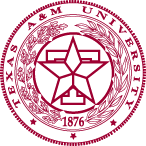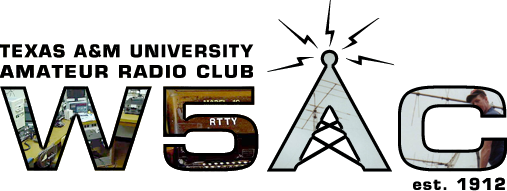



Search:
Callsign lookup:
APRS Locator:
(Type * after callsign for locations that might include a number suffix)
This document describes how to become a "ham" (amateur radio operator). It also answers some common questions about ham radio and about the Texas A&M Amateur Radio Club (W5AC).
Proceed to Advanced FAQ -->
Amateur Radio, also called "ham radio", is a non-commercial radio communication service whose primary aims are public service, technical training/experimentation, and communication between private persons.
Amateur radio operators are commonly called "hams". Hams often communicate with each other recreationally, but also provide communications for others at public events or in times of emergency.
Amateur radio is not the same as AM/FM radio. Besides other differences, amateurs don't "broadcast" to the general public or air music or commercials over their radios. As stated above, amateur radio is a service as well as a hobby.
While AM radio uses a "band" of frequencies around 1 Megahertz (MHz), and FM radio is around 100 MHz, ham radio has many different "bands". They are basically divided between VHF (very high frequency, 50 MHz and higher) and HF ("high" frequency, below 50 MHz) bands.
Morse code knowledge is no longer required for an amateur radio license. Read below for more about the license exam and ham bands.
W5AC is the Texas A&M University Amateur Radio Club. This organization is composed of students, faculty, staff, and other local residents of Texas A&M and the surrounding community.
W5AC operates a radio shack for members to use while they are on campus. The club is affiliated with the American Radio Relay League (ARRL), the national association for amateur radio.
The club has a weekly radio net, meets monthly, and conducts other activities such as:
You must pass an exam to earn your amateur radio license before you can transmit "on the air" with a ham radio. To learn more, please see our page for new hams.
All the license exams are given by teams of three qualified Volunteer Examiners (VEs) who work under a Volunteer Examiner Coordinator (VEC). W5AC works with the Laurel VEC and tries to hold at least one exam session per semester. To learn more, please see our page for new hams.
In the USA, anyone who is not a representative of a foreign government may hold an amateur radio license.
You do not have to be a citizen to obtain a license. You do have to pass an exam to get the license.
These requirements are similar in almost every country.
In the past, hams had to learn Morse code to get a license. Current FCC rules do not require Morse code knowledge for an amateur radio license.
The story on Morse code would be incomplete without explaining ham license types, and the frequency bands they use.
First, the frequencies. Ham radio has many different frequency "bands". They are basically divided between VHF (very high frequency, 50 MHz and higher) and HF ("high" frequency, below 50 MHz) bands.
HF frequencies have a neat property - they bounce off a layer of the earth's atmosphere, back down to the ground. So, HF can bounce around the world! VHF cannot.
In the past, Morse code was the international "language" of worldwide HF ham communication. HF signals bouncing around the world don't care what country borders they cross - making ham a wonderful international hobby. Most countries required their hams to know some Morse code before the hams could be licensed to use (worldwide) HF bands and talk internationally.
Lately, new technologies are as popular in HF bands as Morse code is, including Single Sideband (SSB) voice communications and "digital" communications using computers with radios. More on that later.
Now, the ham license classes. There are currently three license classes in amateur radio: Technician, General, and Extra.
The class for new hams is Technician, which entitles the ham to use VHF and higher-frequency bands. To get a "Tech" license, you take the Technician license exam. The Tech license does not require Morse code knowledge (because it's VHF). Techs' transmissions won't be bouncing around the world, so no need to require the old "international language".
General and Extra licenses require their own additional exams, but in exchange they grant privileges to use HF frequencies (which can be heard around the world).
| Amateur Radio License Classes | ||
|---|---|---|
| Class | Morse code required | Privileges |
| Technician | None. | All ham frequencies above 50 MHz; basically one can communicate statewide all the time, and further some of the time via amateur satellites or other methods. (Ever bounced a radio signal off the moon? Now you can.) |
| General | None. | The above privileges, plus most of the ham frequencies below 50 MHz - reliable worldwide communication. With worldwide privileges come responsibility; the license exam for General requires knowlege of how to operate radio across international borders. |
| Extra | None. | All ham frequencies - typical Extras are building their own equipment and even advancing science, as hams have done throughout the last century. |
Remember the new technology that hams use on HF bands (SSB, digital, etc.)? The international community has begun to allow ham licenses that grant HF privileges without the Morse code requirement, so hams can use those technologies without memorizing the code.
Don't count Morse code out, though. Even in the worst interference, Morse code communications can get through when many other modes can't! For now, if you want worldwide privileges, you learn Morse code.
There is a giant loophole to all these "class privileges": if a ham of a higher class is present, they may allow lower-class hams (or even non-hams!) to transmit with the higher-class ham's privileges!
It costs some time and money to become a ham. How much depends on the individual.
The cost of a radio is really dependent on what you want to do. You could buy a single-band radio for less than $100. You can make your own "homebrew" gear for about as much money and some time; that's a great way to learn about electronics and radio. Or you can buy a new, multi-band multi-mode radio with all the whistles and bells for $300 on up. I'd suggest you learn more about ham radio, talk to local hams, and find out what you want to do with ham radio before you buy.
At Texas A&M, the W5AC club maintains the major types of radios for use by its members. For only $15 in semester dues, members can participate in almost every type of ham activity without having to buy their own radio!
The club currently maintains an e-mail listserv for club announcements and general discussion.
You are also welcome to contact the club's officers directly. Their information is on the officer info page.
The club maintains a World Wide Web site at http://w5ac.tamu.edu/ (this site).
There is also a weekly club net on the club's 146.82 repeater. Nets are held every Monday night at 8:00 PM during the Fall and Spring semesters.
The club holds monthly or twice-monthly meetings. These meetings are usually held in the Shack. Watch the above-mentioned listserv or listen during the weekly net for announcements of dates and times.
Everyone who is interested in amateur radio is welcome to come to the meetings. All licensed amateurs are welcome to check into the club net. You do not have to be a member to attend the meetings, join the listserv, or join the net (though we encourage you to join)!
There are so many things, it's a difficult question to answer, but here are some ideas:
The most important thing you can't do is transact business of any kind over ham radio (under new FCC rules, some types of personal business transactions are now allowed, but there are still major limitations).
Interference to other hams or services, as well as obscene, profane or indecent language is not tolerated and is illegal. Music and broadcasting messages to the general public are not allowed on ham radio.
Some personal conversations may not be appropriate for amateur radio. Do you really want the whole world to hear about Aunt Mabel's arthritis? Remember that anything you transmit may be heard by others.
This FAQ was originally designed and maintained by Peter Gogas - AG5C (formerly, W1AGG).
For more information:
Amateur radio is an ongoing learning experience. While no individual knows everything about ham radio, you can find more information from places like: